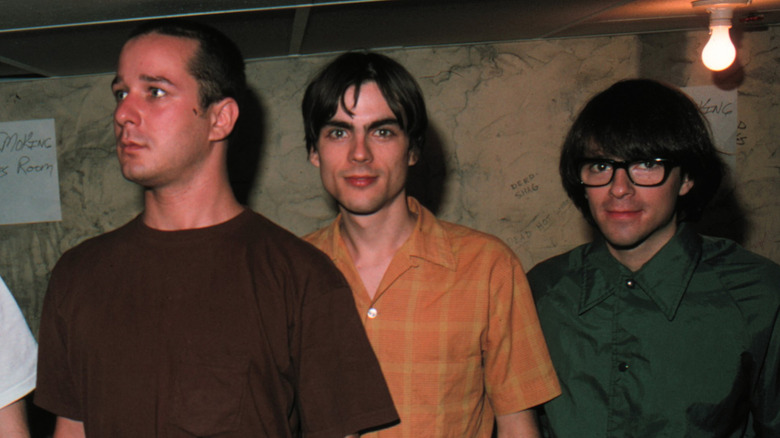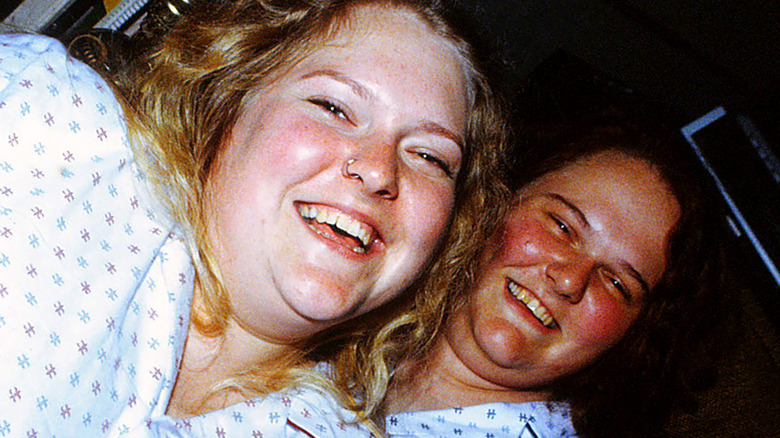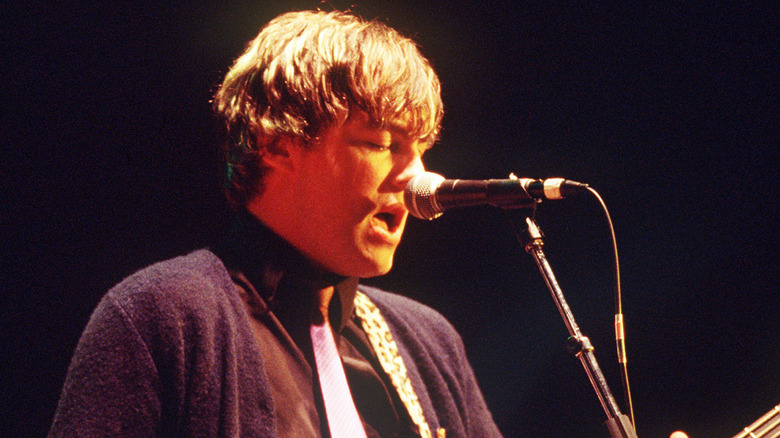The Tragedy Of Weezer Explained
We may receive a commission on purchases made from links.
One of the most iconic bands of the 1990s alternative rock explosion, Weezer inspired both power pop and emo acts with a long string of memorable hits, including "Undone – The Sweater Song," "Buddy Holly," "Say It Ain't So," "The Good Life," "Island in the Sun," "Dope Nose," and "Beverly Hills." With a changing lineup anchored by singer-songwriter Rivers Cuomo, guitarist Brian Bell, and drummer Patrick Wilson, Weezer has been combining hard rock, sensitivity, and magic melodies for more than 30 years. The music itself is catchy: crunchy guitar hooks with a radio-friendly pop sensibility and singalong choruses. But the lyrics to those songs are often about darker stuff, like loneliness, heartbreak, anxiety, and dissatisfaction. That's the unique creative tension endemic to the sound of Weezer.
Still singing about angst after all these years, Weezer performs material about the subjects with which its members are familiar. The untold story of Weezer includes a lot of heartbreak, loss, tragedy, and trauma. Here's a trip into the sad side of Weezer, and a look at the tragic off-stage lives of the band's members.
Weezer fired its original rhythm guitarist
The first sounds on the first Weezer album from 1994 were created by Jason Cropper, a musician kicked out of a group before it made it big. Cropper joined the nascent Weezer in 1992 as a guitarist and played during the early gigs that led to an album deal. Recording began in 1993 in New York City, with Ric Ocasek of the storied band the Cars producing. Hostilities quickly emerged, such as Cropper's personality clash with bassist Matt Sharp, which frontman Rivers Cuomo found distracting.
Then Cropper's partner, Amy Wellner, became pregnant, which upset the rest of Weezer. "That was a bummer for Rivers," Cropper told Yahoo! Entertainment. "Matt was also disappointed in me for starting a family so young." Cropper believed that the others thought his being a family man "would be a liability and that I would not be able to show up at some point." Then, violating Cuomo's rule that band members cut off contact from partners during recording sessions, Wellner traveled to New York. "She didn't want to lose me. I think she was concerned that I was going to move on," says Cropper. "And that was when I was given my notice." Cropper lost his job in Weezer, but retained a writing credit for devising the distinctive picked intro to "The Blue Album" opener "My Name Is Jonas." Cuomo replaced the guitarist's recorded contributions with his own replicated tracks just before the album was finished.
Rivers Cuomo's agonizing surgery
When he was a child, a growth disorder left Weezer leader Rivers Cuomo with one leg longer than the other. "When I was born they were even, but as I got taller, my right leg just couldn't keep up for some reason. By the time I was full grown it was almost two inches shorter than the left leg," he explained on the "Conan O'Brien Needs a Friend" podcast. It's an issue that can be corrected with surgery, but because it's an elective procedure, the operation was never covered by the musician's health insurance plan. He'd have to pay out of pocket for the surgery.
In 1994, Weezer released its debut LP, "The Blue Album," an immediate hit that would go on to sell 5 million copies. By 1995, Cuomo had secured the funds necessary to get his corrective leg surgery. A surgeon cut his femur into pieces and then outfitted the leg with a brace equipped with multiple screws that drove into the bone. Each day, in a very painful act, Cuomo would turn the screws by a millimeter, which eventually resulted in the two-inch extension he required. Recovery was long, difficult, and excruciating. While a summer 1995 tour of the United Kingdom was delayed over Cuomo's medical issues, when Weezer did play those shows, the singer took the stage with the brace intact, while a regimen of medications reportedly offered little relief from the pain.
Weezer's earliest and biggest fans tragically died
Sisters Mykel and Carli Allan moved to Los Angeles in 1989 and became regulars on the local concert scene. A lot of messed up things happened at the Viper Room, but it was still known as Club Dump when Weezer played one of its earliest gigs there in July 1992, and the Allans enjoyed the band. The next night, they met frontman Rivers Cuomo at a party, and the three became fast friends, inspiring the Allans to attend most any and every Weezer show that they could, providing post-concert notes and breakdowns and baking cookies for the band. When the band landed a deal with Geffen Records, the Allans contributed photos for the liner notes, and after Weezer wrote and recorded a song in their honor called "Mykel and Carli" (included as a B-side on some versions of the single "Undone – The Sweater Song"), they agreed to run the Weezer fan club and mailing list.
The sisters were instrumental in the band's early history, and it rocked and upset Weezer when Mykel and Carli Allan died in 1997. The Allans, along with their sister, Trista, caught a tour stop in Denver in July 1997, and while on their way to another show in Salt Lake City, they were involved in a fatal automotive mishap. All three Allans were killed, indirectly adding Weezer to the list of bands involved in tragic accidents while touring.
Pinkerton nearly killed Weezer
Following the multi-platinum, hit single-spawning success of its 1994 self-titled debut album, anticipation was high for Weezer's second album. "Pinkerton" arrived in stores in September 1996, and it was met with a collective shrug. Loaded with lyrically darker and musically edgier material than Weezer's audience was used to and written across frontman Rivers Cuomo's year at Harvard University, it peaked at No. 19 on the album chart and sold far fewer copies than its predecessor. Two singles, "El Scorcho" and "The Good Life," merely faltered in the lower portion of Billboard's alternative rock chart. Critical reviews were middling, too, and all that came after the possibility that it wouldn't be released on time, after the private security agency Pinkerton filed an injunction alleging something akin to trademark infringement.
The reaction to "Pinkerton" deeply stung Cuomo. "I got very sad. I became very unsure of my instincts," he later told Entertainment Weekly. "It was such a hugely painful mistake that happened in front of hundreds of thousands of people and continues to happen on a grander and grander scale and just won't go away." Weezer didn't release a new album for nearly five years, during which time "Pinkerton" earned reconsideration from music writers. Today it's credited with helping to inspire the burgeoning emo rock movement.
Rivers Cuomo's sad, lonely, and painful college experience
In 1995, after the album cycle for the first Weezer album, and after he was fitted with a device to lengthen one of his legs, Rivers Cuomo enrolled at Harvard University. He returned sporadically over the next decade until he earned a bachelor's degree, but Cuomo's first spell at Harvard was fraught with health issues. When he wasn't busy with schoolwork, Cuomo would return to his dorm room to cope with leg pain, through sleeping and the use of medication. "I grew a long beard and walked around with a cane," he told The New York Times. In 1998, Cuomo took a leave of absence from both Harvard and Weezer and lived in a small apartment outside of Los Angeles. "I became more and more isolated," he wrote in a letter to a school official. "I unplugged my phone. I painted the walls and ceiling of my bedroom black and covered the windows with fiberglass insulation."
During some of the periods when he was actively studying at Harvard, Cuomo deeply disliked even discussing his tenure with Weezer. "It was a source of anxiety and tension for me, and when I came here, I wanted to leave it behind and take a break from it and focus on something else for a while. So when someone brought it up, it would be painful for me," he told The Harvard Crimson.
Weezer fired Matt Sharp, and Matt Sharp sued Weezer
Matt Sharp once contributed bass guitar, backing vocals, and humorous falsetto riffs to Weezer's catalog. In 1998, when he was busy with his side project, the Rentals, he was asked to leave his main employer. His last show as a member of Weezer was a benefit concert for the families of deceased Weezer fan club leaders Mykel and Carli Allan. "I seem to recall the other three guys coming up to me and telling me I was fired," Sharp told Alternative Press.
In 2002, Sharp sued Weezer, citing legal malpractice, breach of fiduciary practice, and accounting violations. Sharp alleged that he hadn't been properly credited for his role in co-writing Weezer's first hit, "Undone – The Sweater Song," and nine out of the 10 tracks of the band's sophomore LP, "Pinkerton." Instead, the suit suggests, Rivers Cuomo took full responsibility and ownership of the songs in question, denying Sharp proper compensation in the form of royalty payments. The parties reached a confidential out-of-court settlement, and Sharp and Cuomo eventually reconciled. "We've resumed our friendship, so make of that what you will," Sharp told Perfect Sound Forever in 2004. "The suit itself is something that was, for me, the absolute last resort. It was something that I was basically forced into doing, and it was the last thing I wanted to do because it was very important for me not to soil those memories that I have of those times."
Rivers Cuomo was hurt in a tour bus accident
In early December 2009, Weezer embarked on a small North American tour. After a show in Toronto, the band headed to the next gig in Boston. Rivers Cuomo took his own heavily outfitted tour bus apart from his bandmates, along with his wife, their 2-year-old daughter, their nanny, and Sarah Kim, his personal assistant. While traveling through upstate New York on the morning of December 6, the bus hit a chunk of roadway ice on the New York State Thruway. The driver lost control and the rear half of the bus swayed, forcing the entire vehicle across a median and onto reflective posts before sending it doubling back on the road, whereupon it smashed through a guardrail and into a ditch where it rested about 10 feet below the surface of the highway.
Kim was tossed from her bunk and suffered a fractured lower vertebrae and two fractured ribs. Cuomo was in the bus's rear lounge and was sent airborne, and he hurt his leg and cracked his ribs when he hit the ground. The initial impact and pain left Cuomo unable to talk or move, as well as being stuck in the bus when the doors were sealed shut during the crash. Cuomo and Kim were rushed by ambulance to a hospital in nearby Amsterdam, New York, where Cuomo remained for several days to recover from internal injury and three broken ribs. The remainder of the Weezer tour was canceled as a result.
Mikey Welsh had to leave Weezer
Following the departure of Weezer founding bassist Matt Sharp in 1998, the band filled the void with Mikey Welsh. A veteran of the 1990s alternative rock scene, Welsh previously played bass in the Kickovers and in Juliana Hatfield's backing band. Weezer would be the most high-profile assignment of his career, and he'd play on just one album for the group, its self-titled 2001 LP nicknamed "The Green Album."
While on a Weezer tour in support of that album, all of Welsh's mental and physical health issues coalesced into an untenable quagmire. "A lifetime of doing drugs and being undiagnosed as having bipolar disorder, post-traumatic stress disorder, and borderline personality disorder finally caught up with me," he told the Rock Salt Plum Review (via Weezerpedia) in 2007. After returning to the U.S., Welsh suffered a mental health break and attempted suicide. "I was found and rushed to the hospital where I had come to within minutes of my heart completely stopping. I was in a coma for a few days, and woke up in a lockdown psychiatric ward." At that point, and after failing to show up to the video shoot for the single "Island in the Sun," Welsh left Weezer to focus on his health and his other artistic pursuit of painting.
Mikey Welsh died
Ten years after he played his last notes as a member of Weezer on "The Tonight Show," bassist Mikey Welsh re-emerged in the orbit of his old band. It wasn't entirely positive, and his interactions with his former group-mates were bittersweet. In July 2011, Welsh nearly wasn't allowed into a Weezer show on Long Island, New York, where he attempted to patch things up by gifting a painting to the band. He briefly played guitar during the set, but his appearance was barely acknowledged. Welsh planned on attending a Weezer show in Chicago in October 2011, an event overshadowed by an unsettling social media post. Weeks before the concert, Welsh wrote on X, then known as Twitter, "dreamt I died in chicago next weekend (heart attack in my sleep). need to write my will today."
On October 8, 2011, one day before Weezer's Chicago show, Welsh sadly joined the ranks of '90s musicians who died and no one noticed. When he missed his checkout time at the Raffaello Hotel, employees found the bassist in his room, not breathing and unresponsive. Welsh was pronounced dead at the age of 40. While there was no evidence of foul play, authorities from the Cook County Medical Examiner's Office believed that illegal drugs were a factor in the death.
SZNZ was never in season
Even though experimental albums often don't work out, Weezer decided to flex some of its creative muscle. In March 2022, the musicians announced plans for a year-long project called "SZNZ." Pronounced "seasons," it entailed the release of four limited-length EPs made available at the beginning of spring, summer, autumn, and winter. "This year we're releasing four EPs each inspired by magic, Pagan myths, religious rituals, Vivaldi's 'The Four Seasons,' Shakespeare and more (so much more). Each one will take you on an enchanting journey," the band promised on Instagram.
Few music fans wanted to take such a journey, because "SZNZ" flopped hard. Nearly every prior Weezer release had reached the higher rungs of the Billboard 200 album chart; three of the four "SZNZ" entries missed that list entirely, while the first, "Spring," never made it higher than No. 86. More entries in the "SZNZ" universe were subsequently and unceremoniously called off. A deluxe box set featuring all four EPs plus extensive bonus materials was nixed by Weezer's label. "I just learned the 'SZNZ' box was in fact cancelled, im sorry to confirm," band rep Karl Koch wrote on Discord (via Brooklyn Vegan). "Apparently high cost vs. not expecting enough sales to make it work." That coincided with the shuttering of Weezer's residency on Broadway, due to poor ticket sales that wouldn't cover the cost of production. "I loved where we were going and I hope we can find a way to resurrect our vision," frontman Rivers Cuomo wrote on Discord (via Rolling Stone).
Scott Shriner's wife was shot and detained by police
In 2005, Weezer bassist Scott Shriner married memoirist Jillian Lauren. They live together in northeastern Los Angeles, the site of a strange and potentially deadly incident involving police in April 2025. On the afternoon of April 8, officers from the California Highway Patrol were in pursuit of three suspects accused of a hit and run who evaded law enforcement by heading on foot into the Eagle Rock residential area. Local police created a perimeter, and within those boundaries, one of the three individuals was spotted in a home's backyard. When officers arrived at that spot, they were reportedly greeted by Lauren, standing in the yard of an adjacent house — her residence she shares with Weezer's bassist — and brandishing a pistol.
Ordered by responding police multiple times to disarm herself by dropping the gun, Lauren refused, and continued to hold and aim the gun in their direction. Authorities responded by opening fire on Lauren, and one shot made contact. Lauren ran into her home and then out again, whereupon she was arrested, sent to an area hospital to treat a superficial gunshot wound, and charged with attempted murder. The writer, who at the time had just completed a round of cancer treatments, was freed after meeting the $1 million bail requirement. Shriner didn't miss Weezer's performance at the Coachella music festival the following weekend.
If you or anyone you know needs help with addiction issues or is struggling or in crisis, contact the relevant resources below:
- The Substance Abuse and Mental Health Services Administration website or contact SAMHSA's National Helpline at 1-800-662-HELP (4357).
- Call or text 988 or chat 988lifeline.org











